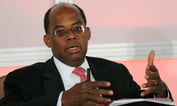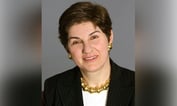Harriet Tubman escaped slavery and courageously helped liberate other slaves in the mid-1800s, leading them to freedom as a “conductor” of the secret Underground Railroad. Deeply inspired by the historic activist, certified financial planner Lazetta Rainey Braxton, an African-American, is leading a proud fight for a “financially liberated America,” she tells ThinkAdvisor in an interview.
Braxton, 45, is a strong voice for diversity in financial services, and her commitment to it is clearly evidenced by her RIA, Financial Fountains. The Baltimore-based firm, serving clients in several states, targets underserved consumers that are “overlooked by Wall Street,” as its website proclaims. Clients are widely diverse generationally, economically, racially and otherwise.
A 20-year-plus industry veteran, Braxton is chair and past president of the Association of African-American Financial Advisors and board president of the AAAA Foundation.
In the interview, she talks about overcoming the challenges of being a black woman working in the white-male dominated financial services industry and the objectionable circumstances that chiefly precipitated her choice of going solo a decade ago.
Braxton’s career began at Marriott, where she worked as an auditor. She then moved into investment management at firms such as Diversified Trust Co. and Brown Capital Management.
She is a prominent advocate for diversity and inclusion at wealth management firms. In an email exchange following the interview, she praised Edward Jones’ initiative to pay an incentive to retiring advisors or those trimming their books if they pass their clients to women or minorities at the firm. She said:
“I commend Edward Jones for recognizing the competitive advantage of supporting and promoting diverse talent by rewarding advisors for aligning their actions with the firm’s objectives. It is a wise investment in the company’s future; consumers will continue to demand financial advisors with cultural competence.”
Braxton’s practice — all about turning income into wealth — is fee-only, requires no minimum and is mostly virtual in operation. She founded the RIA in 2008 during the financial crisis (“For those who understood the value of advice, it was the ideal time.”)
Several of her 30-some clients are HENRYS — High Earners, Not Rich Yet — and two years ago she began also offering services to high-net-worth individuals with assets of $1 million to $5 million.
Braxton was motivated to learn about managing money while growing up in rural Virginia the daughter of blue-collar workers who eked out only a modest living. She went on to earn a Bachelor of Science degree and a Master of Business Administration, both in finance.
ThinkAdvisor recently interviewed the CFP, on the phone from her Baltimore office. The conversation took in her view on why African-American FAs decide to break away from wirehouses, the unfortunate result of which, Braxton says, is the firms’ loss of “great talent that hasn’t been nurtured.”
Here are excerpts of our interview:
THINKADVISOR: How did your early background influence your career ambitions?
LAZETTA RAINEY BRAXTON: I was raised in rural Virginia and didn’t see any black professionals who dealt with money. Coming from parents who hadn’t obtained undergraduate degrees, what I realized was that education and exposure are key — necessary — for people of color to build wealth. But a lot of underserved and overlooked populations don’t get the opportunity to be exposed [to wealth], as they don’t have a long history of generational wealth.
Why did you decide to become a financial advisor?
I wanted to understand the challenges surrounding personal finance, but I didn’t have a career name for that [growing up]. I saw my parents struggle with their finances and wondered how to be educated about managing money well.
What key strength has helped you in your career?
Perseverance, and I have a high tolerance for tension — in other words, courage. I’m open to learning new stuff about things that are awkward to talk about and face. I can handle uncertainty. I’m resilient and resourceful.
You’ve said that you’re “fighting for a financially liberated America.” So, is Harriet Tubman, who escaped slavery and helped other slaves to freedom, a hero of yours?
Very much so. She was relentless in her pursuit to set people free, and she put her life on the line. No one’s threatening my life, but I’ve had challenges and pushback. Facing a lot of challenges is the reason people [especially African-Americans] go out on their own. If we wait for the mainstream to catch up, we may be waiting a long time — which we have.
Has being a black female hindered your career?
I’m very much aware of the challenges. I just don’t allow them to be excuses. Does the fight tire me out? Yes. But, hey, Harriet Tubman did it! So why not me?
What are some of the challenges facing a woman professional in financial services?
The pay gap is [wide compared to men], and the opportunities still aren’t what they’re supposed to be. It’s worse for people of color. Being an African-American female is a double-whammy. Then you add being from a lower economic background, and the chances of success are somewhat dismal.








 February 14, 2019 at 10:48 AM
February 14, 2019 at 10:48 AM











